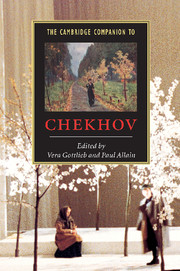Book contents
- Frontmatter
- Part 1 Chekhov in context
- Part 2 Chekhov in production
- 4 From Platonov to Piano
- 5 Chekhov's one-act plays and the full-length plays
- 6 Ivanov: the invention of a negative dramaturgy
- 7 The Seagull: an adaptation
- 8 Notes from a director: Uncle Vanya
- 9 Notes from a director: Three Sisters
- 10 The Cherry Orchard
- 11 Acting Chekhov: 'a friend to the actor'
- 12 The scenography of Chekhov
- 13 Chekhov on screen
- 14 Chekhov on the Russian stage
- 15 Directors' Chekhov
- Part 3 Chekhov the writer
- Appendix 1 Chekhov's works: primary sources from the Russian - Variations of English titles from the Russian
- Appendix 2 Selected stage productions
- Appendix 3 Selected screen versions
- Appendix 4 Illustrations
- Selected bibliography
- Index of Works by Checkov
- General Index
10 - The Cherry Orchard
from Part 2 - Chekhov in production
Published online by Cambridge University Press: 28 May 2006
- Frontmatter
- Part 1 Chekhov in context
- Part 2 Chekhov in production
- 4 From Platonov to Piano
- 5 Chekhov's one-act plays and the full-length plays
- 6 Ivanov: the invention of a negative dramaturgy
- 7 The Seagull: an adaptation
- 8 Notes from a director: Uncle Vanya
- 9 Notes from a director: Three Sisters
- 10 The Cherry Orchard
- 11 Acting Chekhov: 'a friend to the actor'
- 12 The scenography of Chekhov
- 13 Chekhov on screen
- 14 Chekhov on the Russian stage
- 15 Directors' Chekhov
- Part 3 Chekhov the writer
- Appendix 1 Chekhov's works: primary sources from the Russian - Variations of English titles from the Russian
- Appendix 2 Selected stage productions
- Appendix 3 Selected screen versions
- Appendix 4 Illustrations
- Selected bibliography
- Index of Works by Checkov
- General Index
Summary
In 1963, the Marxist critic and philosopher Georg Lukacs resumed his critique of Brecht's epic theatre, questioning its necessity in the depiction of social change:
'Even without alienation effects, writers have succeeded not just in surprising the audience, but in moving them profoundly by dramatizing the contradictions of a given social order . . . [Chekhov's] plays are built on the conflict between the subjective intentions of his characters and their objective tendencies and significance. This constantly creates a divided impression in the minds of the audience. On the one hand, they understand the characters' feelings and can even sympathize with them. At the same time, they are forced into an intense experience of the tragic, tragi-comic or comic conflict between these subjective feelings and the objective social reality.
Whether the objective social reality is apparent as a determining factor in all of Chekhov's major plays is debatable. Certainly, in his early drama Platonov (as it is now known) the chaotic action serves to convey a picture of the Russian landowning gentry in terminal decline. Similarly, in his next play the character of Ivanov embodies the sense of worthlessness and disillusionment that paralysed the educated classes when the high hopes of liberal reform and modernisation engendered by the emancipation of the serfs were extinguished by the accession in 1881 of the autocratic Tsar Alexander III after the assassination of his more progressive father Alexander II. However, by comparison with these early works relatively little indication of the broader social context is given in the three plays that followed.
- Type
- Chapter
- Information
- The Cambridge Companion to Chekhov , pp. 111 - 120Publisher: Cambridge University PressPrint publication year: 2000

